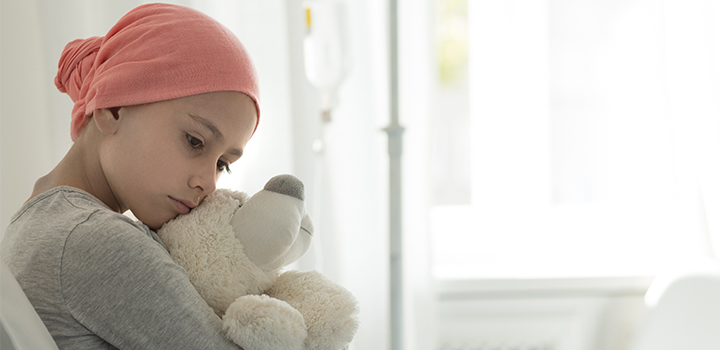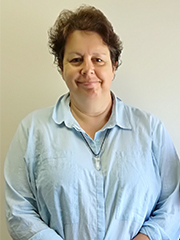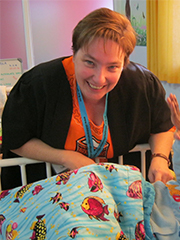Palliative care for kids

Doctors in the field of child palliative care work to surround child cancer-patients and their families with a team of skilled professionals – going well beyond pain alleviation.
“Kids are not supposed to die before their parents. Confronting the sudden prospect of your own child’s death can be simply overwhelming. So much so, that the entire family often goes into a state of denial and pretence in a bid to protect one another from the awful truth,” says Dr Michelle Meiring, Founder and Director of Paedspal, a unique outpatient children’s palliative care facility in Rondebosch, Cape Town.
Paedspal is part of PatchSA, or Palliative Treatment for Children (Patch) South Africa, a national supportive network which links children suffering from life-threatening and life-limiting illnesses, and their families, with appropriate healthcare professionals and caregivers.
Open and honest dialogue - the best medicine
Dr Meiring describes the all-too-common denial that overshadows everything as parents believe that the truth will be too much for their child to bear. The child, on the other hand, knows something is very wrong, and may even suspect that there’s a good chance that they will die. He or she in turn, tries to protect his or her parents and siblings from upset, grief and sadness. So, the child, like the parents, remains silent.
“It’s a parallel process and sadly a lot of people get stuck in this denial stage,” explains Dr Meiring. “I had a recent case where the child had cancer for two years and the parents still hadn’t accepted it. You can’t talk to the child if the parents haven’t accepted it. They need to go through the process.”
Dr Meiring, also a senior lecturer in Palliative Care at the University of Cape Town, says the child very often suspects something is wrong, even though nobody has spoken openly or directly to them about what is happening at any stage of treatment. Reaching openness, awareness and acknowledging what’s going on are critical to dialogue and support. Where possible, the child should guide the process. This is one of the most crucial first goals in dealing with a child’s cancer diagnosis and prognosis.
“Most people trip up at this stage and the child can even get into magical thinking, making up stuff to fill the vacuum,” she adds. She cites a 12-year-old girl with a rare lung disease who was regularly admitted into hospital. After yet another admission, Dr Meiring was called in to do a pain consult: “I asked her what she worried about when it was sore. She said ‘Dying’. If you just keep asking questions, the opportunities for discussion and getting emotions and thoughts out into the open arise.” When Dr Meiring asked her why she thought she was dying, the little girl replied that she knew she was not on the heart-lung transplant list and that if she got sicker her organs would fail and she’d die. “She’d worked that out for herself,” says Dr Meiring.
Listen to our podcast on childhood cancers and learn from a fascinating discussion between two paediatric oncologists and the mother of two young daughters, both diagnosed with cancer here.
Dr Meiring says each child’s journey is unique and there’s no one-size-fits-all approach. “Parents get the best possible medical advice, but what they most want to know is how to detect whether their child is in pain, and how to manage it,” she says. “In most cases parents are trying to ensure the best possible quality of life for their cancer-patient child for as long as possible whilst also coping with general life, school events, working - the run of the mill stuff. Then there’s the marriage to tend to, awkward friends who are unsure how to respond - some just disappear - the other kids to give attention to and there’s a lot to consider.”
A major part of ensuring holistic care for the family means extending support to the family once the child has passed on. Colloquially known as aftercare, Dr Meiring says the lack of a dictionary definition for a parent who has lost a child illustrates how inadequately society deals with this phenomenon. “The words orphan, widow and widower are all there, well explained, but there’s no word for, or definition of, a grieving parent,” she adds pointedly.
Childrens’ palliative care outpatient facilities fill the gap
Paedspal, based at the Rondebosch Medical Centre in Cape Town, emerged from the Red Cross War Memorial Children’s Hospital’s Big Shoes palliative care NGO programme. Paedspal offers a multi-disciplinary team to help kids on a very unusual and difficult journey – a journey which also has potential for profound familial healing, intimacy and growth.
Centres such as Paedspal offer pain and symptom-control, counselling support, multi-disciplinary decision making and advanced and terminal-care planning. These multidisciplinary services ensure the best possible quality of life for children in the final stages of cancer and provide optimal support for their families, working alongside the primary care teams and their communities.
Paedspal is closely linked to PatchSA, the voluntary non-profit organisation run by a committee of nine experts in palliative and child care spread across the main metropolitan areas. PatchSA is a growing network of private and public facilities that can help care for children, whether they offer in-patient palliative services (relatively rare), home-based care, hospital visits or temporary care. Expertise and advocacy is pooled via a WhatsApp group. The steering committee consists of doctors, nurses, social workers, aromatherapists and a disability activist.
According to Fiona McLennan, a lawyer turned reflexologist and aromatherapist, and who co-ordinates PatchSA and who works closely with Dr Michelle Meiring, in the recent past a number of facilities and organisations supporting AIDS orphans and vulnerable children sprung up country wide and, with antiretroviral drugs now turning the tide on the AIDS pandemic, these facilities are today proving ideal locations for wider purpose.
McLennan says five provinces have varying ranges of child-friendly facilities and hospitals that offer end-of-life care, home-based care, hospital visits, and early palliative care (see details at end of article). However provinces with vast rural areas such as North West, Mpumalanga and Limpopo, not to mention neighbouring countries like Lesotho, Swaziland and Namibia, have few or no facilities and children and their families are forced to travel long distances to secure appropriate care.
Palliative Care - an orphan state budget item
Although proper and timely referrals are first-prize for both Dr Meiring and PatchSA volunteers, many families approach them when they have exhausted their medical scheme funding. “As we’re a non-profit organisation, I have two jobs. The first is to do my job and the second is to raise money to do my job,” she explains. She’s hoping the National Department of Health will invest some long-term financial support into facilities like Paedspal.
She’s on the national Palliative Care Policy Task Team which led to the National Department of Health implementing a national palliative care policy in April 2017. An indication of the nation-wide problem is the estimated 90 000 children needing palliative care in the Western Cape alone (one of the best-resourced and funded provinces in the country) - of which some 30 000 need specialist care at the level Paedspal provides.
Introducing palliative care early on: vital
Her career-changing Aha! moment came when she was working as a paediatric registrar at Groote Schuur Hospital in the pre-antiretroviral drug days. She was trying to save a four-month-old baby by using anything that might work and racking her brain for anything she might have missed. Exhausted and feeling helpless, she lost the baby at dawn. Then came the realisation - what was really needed was good palliative care.
She has not lost that steely determination. Instead, she’s transformed it. Now she picks up where other doctors leave off - at the point where they say there’s nothing more we can do. “Those words should be banned for use by doctors. What patients hear is, we’re abandoning you. But there’s never nothing that can be done! Even if I can’t cure you, I can support you through the end-of-life stage,” she explains.
Dr Meiring and Fiona McLennan’s mission is to support children and their families, especially those who cannot express the emotions resulting from a terminal cancer diagnosis, by providing a team of skilled professionals to assist them on their journey, going well beyond mere pain alleviation. This can include art therapists, occupational therapists, aromatherapists, or spiritual counsellors - for them it’s important that their patients and their families know that somebody cares deeply and is available when they need help the most. McLellan says introducing palliative care early on in the diagnosis is vital, especially with rare diseases like Leukaemia which involves traumatic procedures but which has a high cure rate.
“If they’re cured it’s fantastic, and if not the patient and their family already know what palliative care is about, so the transition to end of life care is seamless,” adds Meiring.
Listen to our podcast on Palliative Care for Cancer – a valuable form of care, ensuring quality of life from diagnosis to end-of-life care for every patient, here.
Paediatric palliative and associated care facilities in SA
For updates to this list go to patchsa.org
Western Cape
- Paedspal, Rondebosch, Cape Town (outpatient unit, awaiting hospice completion)
- Heartlands (Somerset West, mainly children in need of care but also end-of-life care, inpatient and home-based care).
- Breede River Hospice: adults and children, home based care and small inpatient unit.
- Nazareth House (Cape Town): Palliative care unit for children with Cerebral Palsy – not yet fully up and running).
- St Joseph’s Home (Cape Town): in patient, long-term rehab, palliative care, children at-risk.
Western Cape
- Umduduzi Hospice Care for children, Durban: Drs Julia Ambler and Tracey Brand. Direct palliative care services to children with life-threatening and life-limiting illnesses as well as teaching health professionals palliative care for children. Children seen in hospital, but no inpatient unit.
- South Coast Hospice, Port Shepstone
Eastern Cape
- Camdeboo Hospital, Aberdeen (limited capacity but can assist)
- St Francis Hospital, Port Elizabeth and Humansdorp
Free State
- Sunflower Hospice, Bloemfonetin
- Ladybrand Hospice (mainly home-based care)
Gauteng
- Lambano Sanctuary Paediatric Hospice unit and step-down facility


The Discovery Health Medical Scheme is an independent non-profit entity governed by the Medical Schemes Act, and regulated by the Council for Medical Schemes. It is administered by a separate company, Discovery Health (Pty) Ltd, an authorised financial services provider.
Related articles
It's normal for every cancer patient to think about the possibility of death throughout their cancer journey. Yet, being told that your cancer is no longer treatable thrusts you into a brand new reality, which can be extremely difficult to come to terms with.
Impact on your family and how to deal with this
A diagnosis of terminal or advanced cancer will affect both you and your loved ones. Everyone will react to this differently and it's important not to shut down to ensure that your wishes and needs are well communicated to both your medical team and your family.
Adapting your lifestyle to complement ongoing chemo
There are enormous emotional and physical challenges when chemo becomes a long term reality, but understanding what these are - and how best to deal with them - will go a long way in maintaining a good quality of life despite ongoing treatment.